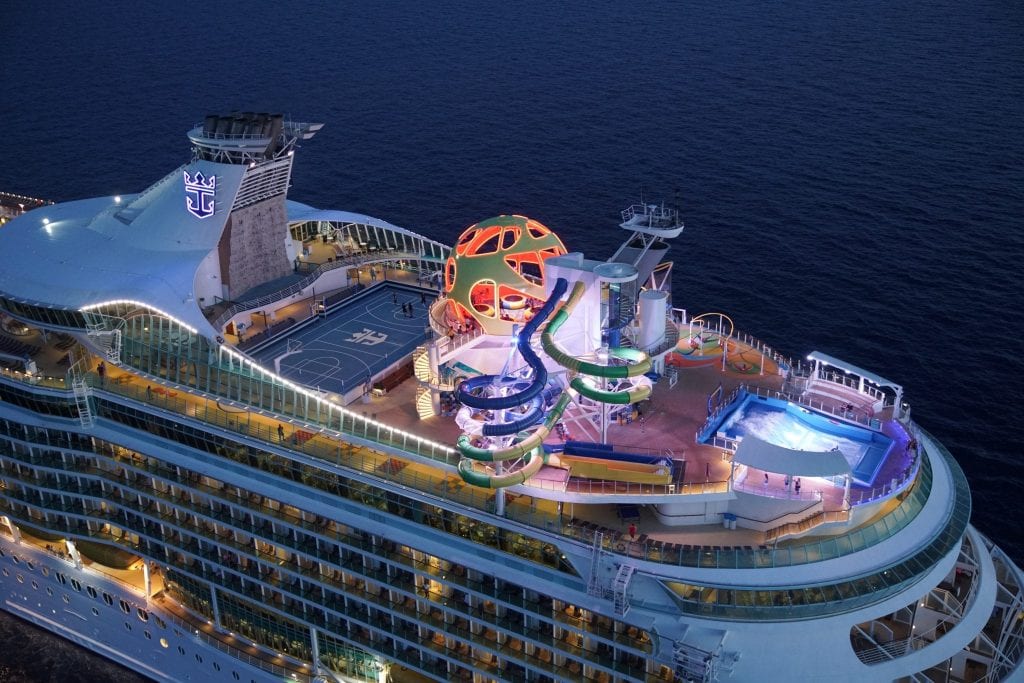Skift Take
Royal Caribbean is investing left and right in technology, new ships, new features on land, and even an entirely new brand. That means costs are up, but the company expects to see those investments pay off.
Royal Caribbean Cruises is on a mission to give passengers the first day of their cruise back — and earn some extra bucks in the process.
That’s the goal of the cruise company’s recently rolled-out “digital transformation platform” dubbed Excalibur, CEO Richard Fain said in an interview Thursday. From a passenger’s point of view, it’s an app that allows them to speed up the check-in process, see a daily planner, access onboard accounts, and book different activities.
Cruisers will typically spend their first day going through check-in, running around the ship, making appointments, checking reservations, and handling other plans for the trip.
“If we can do all of that in a way that’s essentially done in advance … they get an extra day’s vacation out of it,” Fain said.
The company has been promoting its initiative for a year already, but revealed during an earnings call Thursday that the app is in use in some form by nearly 50 percent of guests, with that number increasing each quarter for the next couple of years. Some ships are still in “crawl” mode, while others have reached the “walk” or “run” level.
“With the company using an iterative and progressive rollout to guests, the full suite of app functionality is expected to be nearly entirely rolled out by the end of 2020,” William Blair analyst Sharon Zackfia wrote in a note to investors.
Fain said during the earnings call that the company is “aggressively” rolling out the technology, which is also used by employees. While the priority so far has been to ease the boarding and disembarking process, later features will include facial recognition, chat, and a digital room key.
“Through this type of investment, we are not only expanding and improving the product offering, but also attracting new segments to cruise,” Fain said. “We find that using such technology to reduce the hassle factor behind traveling increases the demand for products.”
Chief Financial Officer Jason Liberty said the company is trying to accelerate its efforts to bring capabilities online earlier than expected.
“The sooner we can get that on the ships, we believe that it will lead to better revenue and better guest satisfaction, as well as a better employee experience for our crew,” he said.
Liberty and Fain also warned that the company’s costs were increasing as a result of the new technology. Royal Caribbean has not publicly put a price tag on Excalibur. In response to the question Thursday, Fain said: “To quote the famous quote, ‘If you have to ask, you can’t afford it.'”
Capital expenditures for 2018 are $4.7 billion, followed by $2.6 billion next year, $3 billion in 2020, and $2.9 billion in 2021.
The company said in an earnings release that costs next quarter are expected to increase between 6 and 6.5 percent, due in large part to the majority acquisition of Silversea Cruises earlier this year. Technology investments will also drive costs up next quarter.
Royal Caribbean is also investing in a new cruise terminal in Miami for its largest ships as well as improvements to a private island, CocoCay, in the Bahamas. A handful of highly publicized new ships are also joining the fleet between now and mid-2019.
“There’s always a lot going on here, and I hope that never stops,” Fain said.
Along with the higher costs, Royal Caribbean also expects yields — or the amount of revenue generated per passenger per day — to increase in the fourth quarter and 2019. Silversea’s luxury operations will be folded into financial results next quarter, and the company said occupancy and rates are higher for 2019 than at the same time a year ago.
Royal Caribbean narrowed its full-year earnings forecast to $8.75-$8.85 a share, compared to its estimate of $8.70-$8.90 a share in early August.
For the third fiscal quarter, the Miami-based operator reported profit of $810 million, up from nearly $753 million last year. Revenue jumped from $2.57 billion last year to nearly $2.8 billion this year. That number was slightly lower than analysts expected, but shares still closed up slightly to $107.96.
“With commentary on par with recent quarters, noting that 2019 booked load and rate factors are higher than the same time last year, and a still-expanding booking window, we don’t foresee any imminent slowdown in the demand for cruising,” Morningstar analyst Jaime Katz wrote in a note to investors.
The Daily Newsletter
Our daily coverage of the global travel industry. Written by editors and analysts from across Skift’s brands.
Have a confidential tip for Skift? Get in touch
Tags: royal caribbean, silversea, technology
Photo credit: Mariner of the Seas, a Royal Caribbean International ship that was recently overhauled, is shown in this promotional photo. Royal Caribbean International
